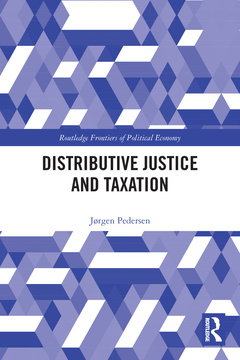Distributive Justice and Taxation Routledge Frontiers of Political Economy Series
Auteur : Pedersen Jørgen

Providing a thorough examination of distributive justice, Distributive Justice and Taxation presents and discusses different theories of what constitutes a just society, and how goods should be distributed in such a society.
The distribution of goods in society has direct and serious consequences on the lives of the people. There are therefore important questions to be asked regarding the justice of that distribution: Is it just that some people inherit large fortunes while others inherit nothing? Do rich people have additional access to political power because of their wealth? If so, is that just? And should the ambition for economic policies be to combat poverty, or to reduce inequality? This book explores these questions and a number of others through the analysis of related theories, spanning from strong egalitarian theories on the left to right-wing libertarianism. The chapters also explicitly examine the case of taxation ? one of the most important and controversial measures of distribution of goods in society. Placing emphasis on the case of Norway and using data from both the UK and USA as a point of comparison, the work details and explores the key features of the tax system. It concludes by presenting and evaluating arguments for and against taxes such as income tax, wealth tax, and inheritance tax.
This book is essential reading for those interested in distributive justice, as well as students and scholars of philosophy, law, political science, and economics.
Introduction: Inequality, justice and redistribution Part 1: Theories of justice 1. Justice as fairness: John Rawls 2. Libertarianism: Robert Nozick 3. Equality of resources: Ronald Dworkin 4. Equality and community: G.A. Cohen 5. The capability approach: Amartya Sen and Martha Nussbaum Part 2: Controversies 6. What is the value of equality? 7. Equality– a distributive ideal or an ideal of social relations? Part 3: Intervention: Just taxation 8. Foundational philosophical issues 9. The Norwegian tax system 10. Inheritance tax 11. Taxation of wealth Conclusion Literature
Jørgen Pedersen is Professor of Practical Philosophy at the Department of Business Administration, Western Norway University of Applied Sciences, Norway.
Date de parution : 08-2022
15.6x23.4 cm
Date de parution : 12-2020
15.6x23.4 cm
Thèmes de Distributive Justice and Taxation :
Mots-clés :
Agnostic; UN; Liam Murphy; Good Life; Thomas Nagel; Luck Egalitarianism; Robert Nozick; Option Luck; John Rawls; Wealth Tax; income tax; Inheritance Tax; Violate; Difference Principle; libertarianism; Brute Luck; egalitarianism; Egalitarian Ethos; taxation; Brute Bad Luck; Political philosophy; Norwegian Welfare State; Political power; Negative Thesis; Progressive taxation; Broad Tax Bases; Egalitarian principle; Standard Deduction; Distributive justice; Average Income; Democratic Equality; Large Inequalities; Top Marginal Tax Rate; Egalitarian Theory; Norway Today; Capability Approach; Pre-tax Income; Dworkin’s Ideal



